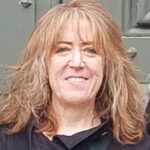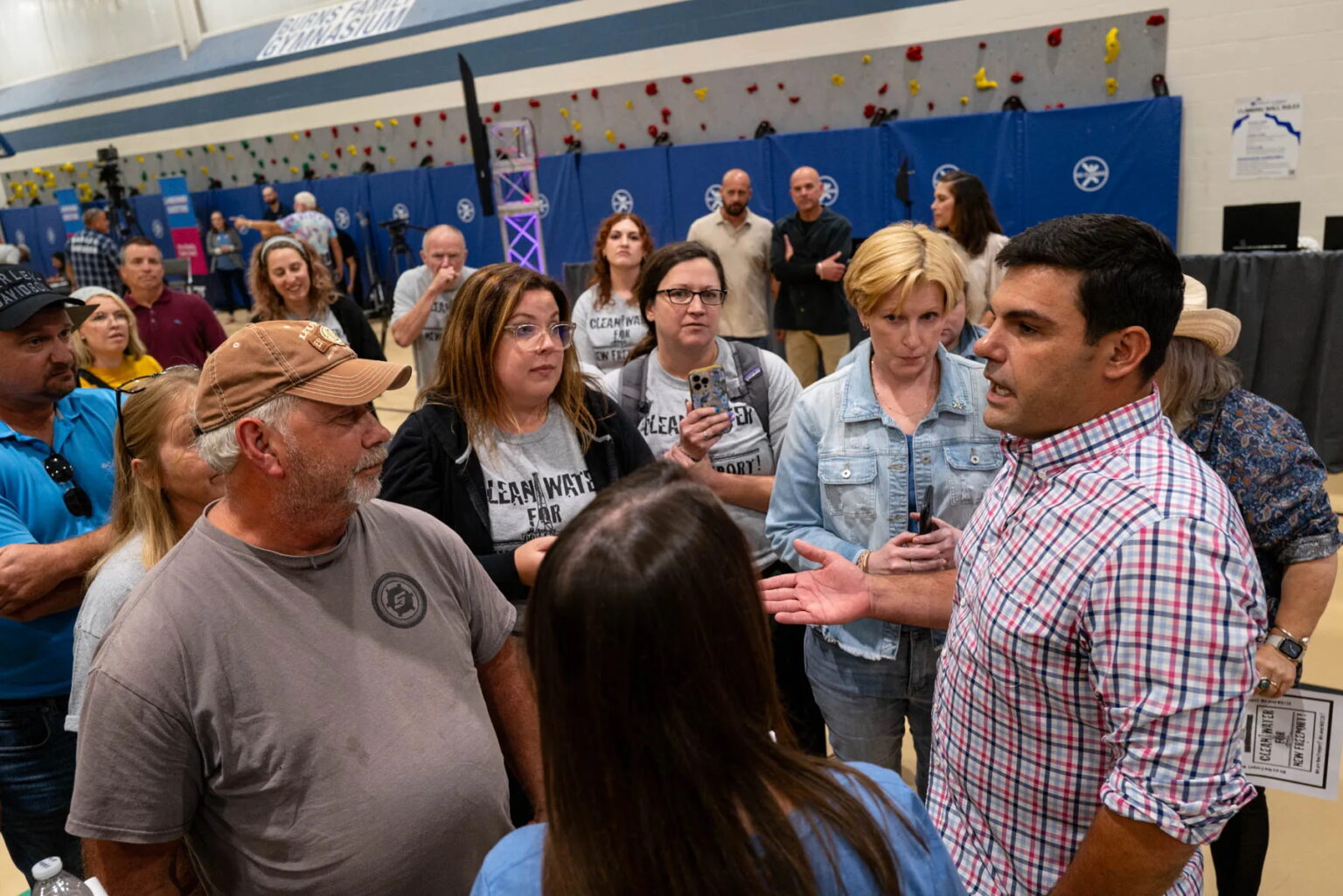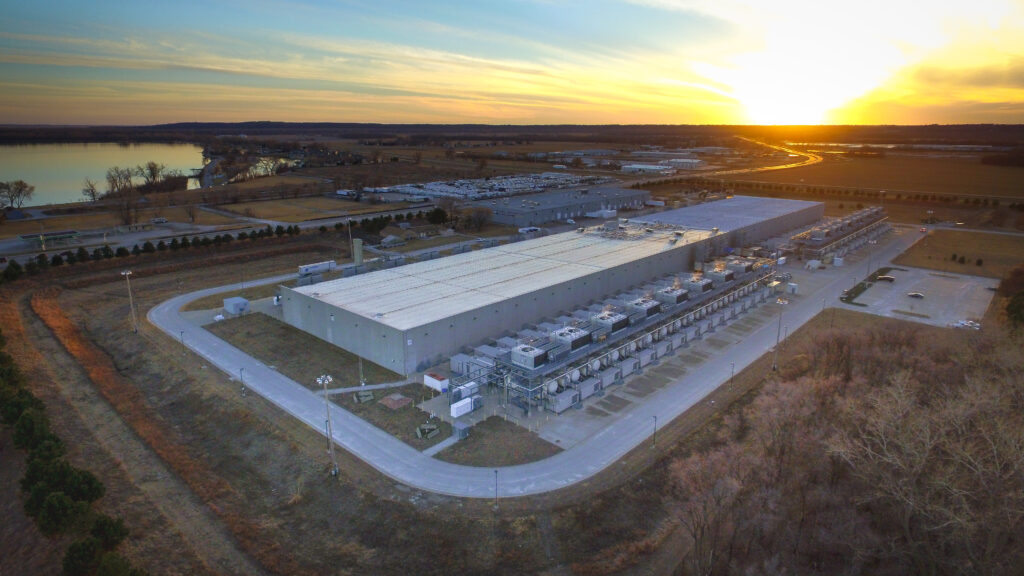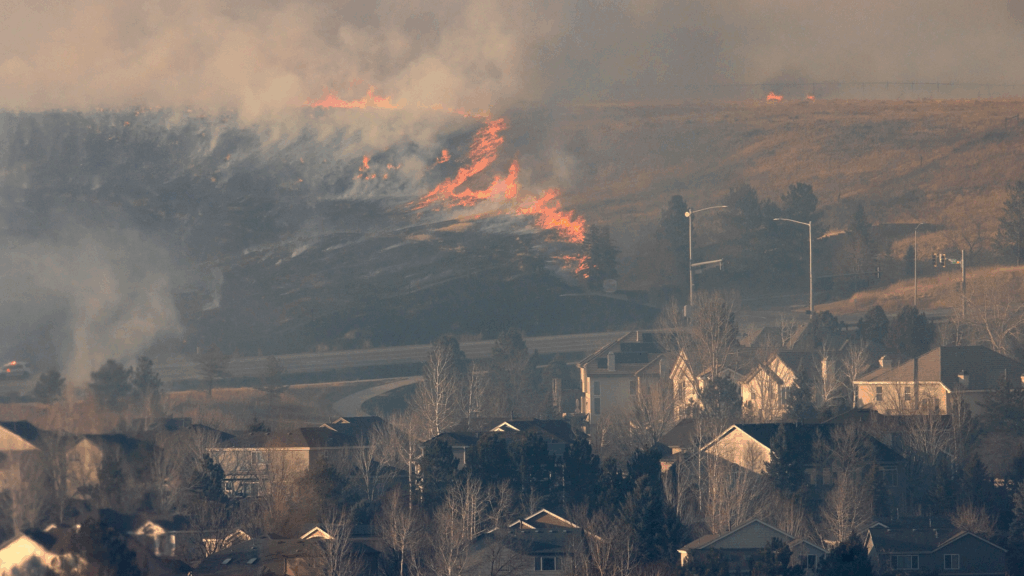This article was originally published by PublicSource, a nonprofit newsroom serving the Pittsburgh region.
Carmen Aberegg sat in the rear of the New Freeport firehall in early May, poring over a packet of papers that contained the milligram-per-liter quantities of the chemicals, metals and gasses in her drinking water. The water had been tested seven times.
She recalled the wretched smell that wafted from her Deep Valley home’s well when the Pennsylvania Department of Environmental Protection [DEP] arrived in October 2023 to test her water. “It’s gas,” the inspector told her, she recounted.
Days earlier she had received an email: “Dangerously high methane in water,” the subject line read. An environmental microbiologist at Duquesne University, John Stolz, had found enough methane to pose a “risk of ignition.” Stolz, the university’s director of the Center for Environmental Research and Education, advised her not to use the water, let alone drink it, and to call the DEP immediately.
“It was horrific,” Carmen said. “The results were terrible.”
The water had developed a sulfur-like odor and a chemical aftertaste. Stolz found ethane, and chloride levels five times the federal standard. (Fracking brine contains high concentrations of chloride, and the DEP said its presence is often used to determine if water has been impacted.) The DEP testing found sodium 14 times higher than the amount the agency recommends.
Carmen passed her packet across the table to Tim Brady, a Freeport Township supervisor, whose well has been bad ever since EQT fracked nearby and fluid erupted from an abandoned gas well along Main Street in New Freeport on June 19, 2022. Tim spent nearly $10,000 to install a reverse osmosis system, but his water is still carbonated with methane.
“Holy shit,” he remarked as he flipped through Carmen’s most recent round of testing, this time completed by EQT’s contractor, Moody and Associates, in March. “You got a cocktail, Carmen.” Heavy metals like potentially toxic manganese, iron and aluminum were all above the federal limit. Compounds associated with produced water from fracking — arsenic, strontium and barium — were also identified, and the methane was still there, too.
Soon, the fire hall was full of people who sought answers about their own wells.
State Rep. Bud Cook, R-Greene and Washington counties, sat in the back wearing a cap that read “We the People…” with an aide, listening to the many accounts of residents who had lost clean water during the preceding 23 months. He attended the meeting after residents had asked for his ear (or that of any elected official) since the fracking mishap and the nearly simultaneous reports of devastated water quality in the tiny town. He suggested residents, aided by the Center for Coalfield Justice, seek a hearing in front of the House Environmental Resources and Energy Committee, and he pledged to support that effort.

Situated between four EQT well pads near the West Virginia border in Greene County, New Freeport residents have endured nearly two years of uncertainty regarding the safety of their water — and the concern is spreading. Recently, residents like Carmen, of nearby Deep Valley, have reported troubles with their wells: an onset of stinking, discolored water rife with black specks. They’ve suffered from painful skin rashes. Chemicals EQT uses in fracking can cause those symptoms.
“It’s really surprising how widespread problems are,” said Stolz, who has tested 64 wells since the incident. His results showed contamination from a combination of methane and ethane, salts and heavy metals. Stolz found 20 water wells with methane concentrations above the DEP action limit. “People with incredibly bad water,” he summarized.
Carmen is one on a growing roster of people who have reported newly contaminated water after pressure from fracking at EQT’s Lumber Pad erupted in a frack out in the unincorporated hamlet of roughly 80 people. In a frack out, highly pressurized fluid pumped into a well to fracture shale formations and release gas instead connects underground with an abandoned well, sometimes finding a route to the surface. Dozens, if not hundreds of abandoned wells — many unmarked and unidentified like the one that erupted in New Freeport — speckle the wooded countryside.
As EQT boasts of drilling longer and extracting more efficiently than its competitors, the company has denied any culpability for the incident and its effects on local water supplies. In filings with the state, EQT denies it even occurred — even after its own representatives were caught on video observing “direct correlation” between EQT’s fracking and the gas roaring from the ground in New Freeport.
EQT did not respond to PublicSource’s request for an interview, nor to questions posed to the company regarding the frack out in New Freeport and the status of resident water supplies.
Citing an ongoing investigation, the DEP declined to grant PublicSource’s requests for an interview. Spokesperson Lauren Camarda wrote in a statement that the agency “has scrutinized, and continues to scrutinize, EQT’s operations” around New Freeport, adding that the DEP “has access to unprecedented, real-time microseismic data” collected by the company, which charts underground fractures and “is intended to continue to protect all wells and water supplies in the area.”
To date, the DEP has issued 13 letters in response to resident complaints. For 11 of those, the agency told residents that it “cannot conclude” that their water was adversely affected by oil and gas activities. For the other two complaints, involving spring water, the agency found no adverse impact.
The agency advised residents that their water did not meet “health and/or aesthetic statewide standards,” suggesting residents consider measures to purify their water. The agency continues to investigate 10 additional complaints, but wrote that “it does not appear that their water was impacted by the incident.”
Residents — test results in hand — aren’t convinced.
“People’s water didn’t just go bad by itself,” Carmen brooded.

Smashing shale, and records
Nine months earlier, in late August, Cook sat in the front row inside the packed EQT Rec Center in Waynesburg. He and fellow elected officials clapped for Toby Rice, the CEO of EQT, who spoke about the company’s ambition to quadruple American gas exports and “Unleash U.S. LNG.”
“Greene County is core to EQT,” Rice said. The company operates 923 wells bored horizontally underground for a collective 6.9 million feet beneath Greene. More than a third of EQT’s total gas production comes from the county — and they’re still drilling, Rice said, with another 60 wells soon to go online.
Reader support is also a critical part of how we produce stories like this — donate now.
The corporation is the largest gas producer in the United States. If EQT were a country, Rice has said, it would rank as the 12th-largest gas producing nation in the world. Its production had rocketed, thanks in part to soaring international demand after Russia invaded Ukraine. Rice argued that his fossil fuel — liquified and exported around the world in the form of LNG — is “the biggest green initiative on the planet” and a key solution to the world’s warming crisis. (Scientists say this is false.)
Rice praised the company’s record-setting operations. Last year, EQT set the drilling world record twice, breaking its own mark by boring 18,264 feet in 48 hours. The company was outpacing its competition. “Our wells are 20 percent longer,” Rice said. “We’re drilling almost 70 percent faster than our peers.” EQT had reached “peak efficiencies” for pumping pressurized fluid into the ground to break rocks and suck up the fossil gas hidden deep inside the earth. “It’s absolutely amazing,” Rice said.
Longer wells meant that EQT could extract more gas at less cost. But for all the speed and records set, retrieving that gas from thousands of feet beneath the earth’s surface invariably required one thing: pressure.
Privately confirmed, publicly denied
In New Freeport, that pressure appears to have migrated underground from a depth of 7,820 feet and across more than a half-mile, through some combination of rock, fault lines and fractures, to eventually burst from a rusted, abandoned well set back from New Freeport’s Main Street, according to DEP documents.
EQT was first alerted to the issue on June 19, 2022, when a New Freeport resident reported that the abandoned well behind their house had erupted.
That evening, the company performed a test to see if their fracking at the Lumber Pad had connected to the abandoned well in New Freeport. EQT’s manager of hydrogeology, Dave Allison, called the DEP to report the findings the next morning. Allison said that when the company stopped fracking, the abandoned well stopped percolating. When they resumed, the bubbling returned.
Nine months later, EQT sent the agency a video of that test. In the recording, workers observe a grass-covered hole in the ground behind a house in New Freeport. Then, a pulsing roar drowns out the chirping birds.
“They just started it up a minute ago,” the worker recording the video says. “It’s blowing gas out like crazy!” The weeds surrounding the hole blow in the gusts.
“There’s fluid coming out,” a person off camera says moments later. “That’s a direct correlation in my book.”
In numerous reports, the DEP refers to the incident as a “confirmed communication” between EQT’s Lumber Pad and the abandoned well, called Fox Hill #1.
Immediately, residents began to report changes to their water. An oily sheen and a foul smell soon developed in water wells along Main Street. Some neighbors reported bright, painful, red rashes after showering. In the following weeks, test results from the DEP, Moody and Associates and Stolz identified high levels of methane in local water wells, and revealed troubling amounts of heavy metals, salts and other elements typical of the gas industry. Some residents reported bubbling, abandoned gas wells, deep in the woods, that weren’t doing that before.
In the months following the incident, EQT publicly deflected responsibility for the frack out, reporting a “possible communication.” In later filings with the state Environmental Hearing Board, the company wrote that there was “no evidence” supporting the DEP’s contention that a communication had occurred.

Fracking approved, monitoring found turned off
After the frack out, the DEP requested that the company survey nearby structures and water supplies for “stray gas,” and identify wells that might act as conduits for fracking fluid or gas into the aquifer. EQT identified 140 properties that could be potentially impacted by the frack out, emails sent to the DEP show.
As the company, its contractors and the DEP investigated the incident during the spring and summer of 2023, EQT was also pushing to resume fracking at both the Lumber Pad and an adjacent pad, named the Spleen Splitter, north of New Freeport. The DEP told EQT that it could not resume operations until it had identified the cause of the frack out.

In April, DEP inspectors found an old gas well gurgling in the woods, directly above a lateral of the Spleen Splitter.
In an Aug. 10 letter to EQT, the DEP said that, because the Spleen Splitter wells “straddle” the abandoned well in New Freeport, and because EQT had failed to provide an analysis of what caused the frack out there, the department could not “sufficiently conclude that a communication incident will not happen again.”
Fracking at the Spleen Splitter, the agency wrote, “cannot be assured to be implemented in a manner that appropriately mitigates the risk of the transfer of measurable pressure or fluid flow to wells” in and around New Freeport.
EQT appealed the agency’s decision in September, arguing to the state Environmental Hearing Board that the state was creating “obstacles and delay,” which impose “significant financial burden on EQT.” Though it hadn’t completed a root cause analysis, the company said it had concluded that “there was no communication” between their frack and the abandoned well in New Freeport.
An ensuing settlement, signed in mid-November, allowed EQT to resume fracking at the Lumber Pad and Spleen Splitter, while investigations into potentially contaminated water supplies were unresolved, and without completing a root cause analysis for the frack out. The company agreed to roll out thousands of feet of microseismic cables through the woods around New Freeport to listen for fractures beneath the surface, and said it would monitor the pressures at a number of shallow wells nearby, including the abandoned well in New Freeport, to detect any sudden changes. The company agreed to submit a root cause analysis of the original incident after the wells were fracked.
The settlement made no mention of the people in New Freeport who reported contaminated water.
On Dec. 13, EQT resumed fracking at the Lumber Pad. If any of the monitored wells showed more than a 10 percent increase in pressure, the operation would automatically be shut down. But when DEP inspectors arrived in New Freeport that day, they found EQT’s electronic monitoring equipment was off and not displaying pressures, and the valve to the pressure meters was switched off. DEP noted the issue, and EQT said they would address the problem immediately.
Weeks later, on Jan. 5, EQT reported a “microseismic event” that forced the company to temporarily stop fracking.

Spreading reports of rashes
A few miles up the road from Carmen’s home in Deep Valley, 16-year-old Nicholas Durdevich said he developed bright red rashes along the length of his body last summer.
“I would scratch them and they would bleed,” he recounted. “It went on every day.”
Suspecting an allergy, his parents, Michael and Jamie, switched soaps and took their son to the doctor. Neither offered relief. But once the family stopped using their well water, Nicholas’ rashes stopped, he said.
Carmen’s neighbor and her four children had the rashes, too, she said.
In New Freeport, Tim Brady’s wife and Tonya Yoders’ brother, Loran, developed those same red rashes and burning sensations after showering shortly after the frack out. “Looked like I just took a piece of wire or something and whipped that boy from his head to toes,” Loran’s father, Bill, said later. “Just welts all over him.”
Numerous chemicals used by EQT to frack the Lumber Pad can cause severe skin burns, according to manufacturer safety sheets.

(Left) A water buffalo rests outside a home in New Freeport on May 9. (Right) Michael Durdevich sits at his home in Deep Valley. “At what point do you start caring about people?” he questioned.
“The ripple effect of polluted water is getting wider,” said Sarah Martik, director of the Center for Coalfield Justice [CCJ], an advocacy organization working with residents in New Freeport. She pointed to people farther away from New Freeport, like Carmen and the Durdevich family, who began to notice problems in their water months after the frack out.
Martik pleaded for help from Cook at the firehall in May.
“Almost every single one of the people in this room have been asking for help from elected officials for over two years, and they’ve had nothing,” Martik said to the representative. “No one at any level of government has responded to them or come to these meetings to hear their concerns. No one’s come to their houses to see what’s going on, look at their water, to smell it for themselves. That’s why you’re here tonight.”

New Freeport confronts CEO Toby Rice
At the Waynesburg town hall in August, after Rice finished his remarks, the people of Greene County were invited to speak.
Tonya Yoders stepped to the microphone, wearing a gray T-shirt with the silhouette of a well against the text, “Clean water for New Freeport.”For 14 months her parents, Bill and Tammy, had driven 7 miles each way from the family home on Main Street to Hundred, West Virginia, to buy bottled water after theirs became undrinkable.
“Residents have been wondering where you have been and have been wanting to talk to you directly,” Tonya addressed Rice, with a dozen residents of New Freeport and staff of the Center for Coalfield Justice behind her in the crowd. The town hall was their only opportunity to speak with Rice after more than a year spent attempting to negotiate for clean water.
“Many of us have lived here for generations. Many of us have worked for industry, and we all have observed and lived through the consequences of the quality of our water deteriorating quickly after the frack out incident,” Tonya said.

The community had called elected officials, she said, looking to her right at Cook, state Sen. Camera Bartolotta, R-Monongahela, and the other politicians in the front row. And they had called the DEP and EQT’s water testing contractor, Moody and Associates. They had detailed the bubbling water, rancid smells, oily textures and grainy black substances that weren’t in their water before the frack out, Tonya said. Her neighbors had reported rashes, nausea and anxiety. Their animals refused to drink the water.
“While you can not make up for this past year of loss for these residents, who are purchasing water by the gallon, you can do right by them,” she said.
“We are here to ask you to do right by New Freeport as you continue expanding your operations across Greene County.” Tonya held up a bottle of water from her parents’ house and offered it to Rice to drink.
Ignoring the offer, Rice said he did not believe EQT was responsible.
“We do not believe that our fracking operations were in communication with that shallow well,” he said, while promising to investigate every issue. “We need to get more data. We need to let the DEP finish their investigation, and then we can pass judgment.”

When the meeting concluded, the residents of New Freeport converged on Rice, demanding a meeting to discuss a new source of water, to which he agreed.
Tonya and her parents, CCJ and a handful of New Freeport residents met with EQT at the company’s offices in Canonsburg on Aug. 30. By Labor Day, EQT began to deliver water buffaloes to residents, even as the company continued to deny being at fault. Now, nearly every home along Main Street is connected by a tube to a large tank of water, refilled weekly.
Water for silence
Since November, residents have received letters in the mail from EQT that outlined a proposed deal. They were offered two choices.
Option one: EQT would pay for the installation of a water treatment system.
Option two: The company would supply the water buffalo for an additional 12 months.
If they didn’t sign, EQT would stop supplying water in July.
EQT was explicit that the company was not admitting wrongdoing, liability or “that the water conditions were as they have been alleged.” The company wrote that the agreement was voluntary and “in the spirit of being a good neighbor.” The proposal included a non-disclosure clause, barring residents from publicizing the arrangement or disparaging EQT if they agree to the terms, and it absolved EQT of any future liability for personal injury or property damage.
In January, a representative from Culligan’s, the water company retained by EQT to install water filtration systems, met with residents at the fire hall. The filtration systems, he said, would not be capable of removing fracking fluids from the water, if indeed they were present as many residents suspect. Few, if any, signed the agreement, and Culligan’s told PublicSource no water systems have been installed in New Freeport.
The people of New Freeport, meanwhile, continue to live in uncertainty.
“If they take our water buffalo, we’ll have to drink the contaminated water,” Carmen said. “We can’t afford to pay for water.”
She said EQT hasn’t returned her calls. “No word whatsoever,” she said. “I’m in the dark with bad water.”

Quinn Glabicki is the environment and climate reporter at PublicSource and a Report for America corps member. He can be reached at [email protected] and on Instagram and X @quinnglabicki.
Photos by Quinn Glabicki.
This story was fact-checked by Matt Maielli.
This story was supported by the Pulitzer Center.
This article first appeared on PublicSource and is republished here under a Creative Commons license.
Subscribe to our newsletter
Stay up to date with DeSmog news and alerts







